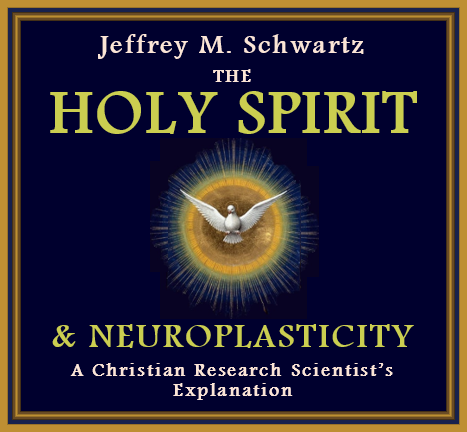The Holy Spirit and Neuroplasticity - A Christian Research Scientist’s Explanation: Jeffrey M. Schwartz
The Holy Spirit and Neuroplasticity - A Christian Research Scientist’s Explanation: Jeffrey M. Schwartz
***
Jeffrey M. Schwartz, M.D. is a Christian. He is Research Psychiatrist at UCLA School of Medicine and a seminal thinker and researcher in the field of self-directed neuroplasticity. He is the author of over 100 scientific publications in the fields of neuroscience and psychiatry, and several popular books including You Are Not Your Brain: The 4-Step Solution for Changing Bad Habits, Ending Unhealthy Thinking, and Taking Control of Your Life co-authored with Rebecca Gladding, M.D. (2011), as well as The Mind and the Brain: Neuroplasticity and the Power of Mental Force (2002), and Brain Lock: Free Yourself from Obsessive-Compulsive Behavior (1997).
***
Below is a collection of links to articles by Dr. Schwartz published by the Biola University Center for Christian Thought.
***
EXCERPT FROM: Jeffrey M. Schwartz (Research Psychiatrist, UCLA School of Medicine), “Neuroplasticity andSpiritual Formation,” The Table (Biola University Center for Christian Thought), April 18, 2019
https://cct.biola.edu/neuroplasticity-and-spiritual-formation/
~ Self‑Directed Neuroplasticity and Spiritual Growth through Grace ~
We can see how this notion of self‑directed neuroplasticity enables us to change our brain through a wholesome focus of attention, guided by the Holy Spirit, guided in consultation with the wise advocate, that then wires our brain to be less deceptive, less intrusive—to have less power in distracting us away from being transparent so that we can more clearly see, perceive, adapt ourselves to follow God’s plan for us—which, of course, means living a more Christ‑like life.
Thus, self‑directed neuroplasticity can play a key role in our coming to an understanding of why we want to use spiritual growth to change our brain. When we use spiritual growth to change our brain through self‑directed neuroplasticity, as guided by the Holy Spirit, we are making our own brains more conducive to us being transparent before God, which, through grace, will make us more receptive to God’s plan for us.
***
Articles By Jeffrey M. Schwartz
Neuroplasticity and Spiritual Formation, April 18, 2019
The Brain and Self-Judgment: How Does Religion Affect the Pre-Frontal Cortex?, December 19, 2016
Using Mindfulness to Become a Better Leader and Communicator, June 11, 2014
Being mindful and changing your brain, January 31, 2014
How Mindfulness Treats OCD, December 17, 2013
Christ in You: How Mindfulness Connects You to the Holy Spirit, December 17, 2013
How Mindfulness Can Change Your Brain, December 17, 2013
Be a Better Leader and Communicator with Mindfulness, December 17, 2013
Jeffrey Schwartz: 4 Steps to Changing Your Brain for Good, December 17, 2013
How to Change Your Brain in Less than 60 Seconds, December 17, 2013
How to Control Your Emotions, December 17, 2013
Mindful Breathing Exercises: Getting Mentally Fit, December 17, 2013
Mindful Awareness: Your Wise Advocate Within, October 9, 2013
***
LONGER BIOGRAPHY
Jeffrey M. Schwartz, M.D. is Research Psychiatrist at UCLA School of Medicine and a seminal thinker and researcher in the field of self-directed neuroplasticity. He is the author of over 100 scientific publications in the fields of neuroscience and psychiatry, and several popular books including You Are Not Your Brain: The 4-Step Solution for Changing Bad Habits, Ending Unhealthy Thinking, and Taking Control of Your Life co-authored with Rebecca Gladding, M.D. (2011), as well as The Mind and the Brain: Neuroplasticity and the Power of Mental Force (2002), and Brain Lock: Free Yourself from Obsessive-Compulsive Behavior (1997). Dr. Schwartz has been featured nationally on prominent TV shows, including Oprah, 20/20, Today Show, Donahue and Leeza. He was a consultant to Martin Scorsese and Leonardo DiCaprio on The Aviator (and appears with them on the bonus DVD extras of that film) and appeared in Expelled: No Intelligence Allowed.
Dr Schwartz's primary research interest over the past two decades has been brain imaging and cognitive-behavioral therapy, with a focus on the brain mechanisms and psychological treatment of obsessive-compulsive disorder (OCD). Dr. Schwartz's most recent academic writing has been in the field of philosophy of mind, specifically on the role of volition in human neurobiology. He has also applied his approach of "mind over brain" to the fields of business leadership and organizational behavior, as featured in two articles in Strategy+Business magazine in 2006 and 2011.
After receiving an honors degree in philosophy from the University of Rochester, Dr. Schwartz began to devote a substantial amount of time to Buddhist philosophy --- in particular to the philosophy of mindfulness, or conscious awareness, which revolves around the central idea that the mind is an active participant in the world and that its actions have a physical effect on the workings of the brain. He thus set out to find a scientific underpinning for the belief that mindfulness affects how the brain functions, and in the 1990s finally made his key discovery at UCLA. As shown on PET scans, a four-step cognitive behavioral therapy that he has pioneered is capable of actually changing the activity in a specific brain circuit of patients with obsessive-compulsive disorder.
Dr Schwartz's current passions include the philosophy of Soren Kierkegaard and Dietrich Bonhoeffer, classic jazz, and the role of Christian meditation in enhancing mindful awareness and its effects on mind-brain relations.
WEBSITES
***




Comments
Post a Comment